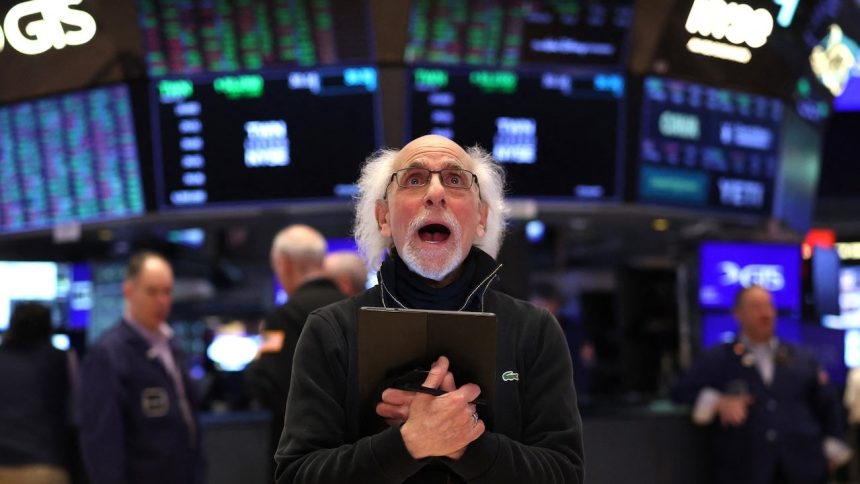TIMOTHY A. CLARY/Contributor/Getty Images
The world’s largest stock exchanges offer thousands of stocks for investors to trade with trillions of dollars in listed stocks. The ranks of the biggest exchanges include those in the United States, Europe, China, Japan and India, with an exchange needing a market cap of at least $3.8 trillion to crack the top 10 list.
Exchanges measure their size in two key ways:
- Listings: This figure includes the number of stocks on the exchanges, both domestic and foreign issues that trade there.
- The market capitalization: This figure measures the market capitalization of all the companies trading on the exchange. That is, market cap is the total value of all the shares of all the companies listed there.
The world’s 10 largest stock exchanges
| Exchange | Market capitalization | Listed issues |
| New York Stock Exchange | $31.7 trillion | 2,126 |
| Nasdaq | $29.9 trillion | 3,285 |
| Shanghai Stock Exchange | $7.3 trillion | 2,284 |
| Japan Exchange Group | $6.9 trillion | 3,958 |
| Euronext | $6.0 trillion | 1,808 |
| London Stock Exchange | $5.9 trillion | 1,025 |
| Hong Kong Exchanges and Clearing | $5.2 trillion | 2,633 |
| National Stock Exchange of India | $5.2 trillion | 2,735 |
| Shenzhen Stock Exchange | $4.6 trillion | 2,872 |
| TMX Group | $3.8 trillion | 3,581 |
The American stock exchanges offer the deepest markets, with both the New York Stock Exchange (NYSE) and Nasdaq featuring some of the world’s largest companies. All the top players offer at least a thousand issues on their exchange, though smaller exchanges in developing markets or frontier markets may offer hundreds or even only dozens of stocks.
Some of the names above include multiple local stock exchanges. For example, the Japan Exchange Group includes the Tokyo Stock Exchange, the Osaka Securities Exchange and the Tokyo Commodity Exchange. Similarly, the Euronext includes exchanges in Paris, Amsterdam, Brussels, Dublin, Lisbon, Oslo and Milan.
What is the world’s largest stock exchange?
The world’s largest stock exchange by total market capitalization is the NYSE, which is owned by Intercontinental Exchange, with $31.7 trillion in shares listed on its exchange, as of May 2025. Not far behind is Nasdaq, which has $29.9 trillion in market cap listed. The Nasdaq includes some of the fastest-growing tech stocks such as Apple, Amazon, Microsoft, and Alphabet, so its total market cap may soon surpass that of the NYSE.
Is it valuable to trade on a specific stock exchange?
For investors, the most important value of an exchange is being able to buy the stock or other security that they want. Stocks are primarily listed on one exchange, though they may have a secondary listing on a foreign exchange and trade on it as a depositary receipt.
For example, a European company may have its primary listing in London but also list shares in the U.S. through American depositary receipts (ADRs). Here, a financial institution holds shares in the primary listing and then issues an ADR that trades on the American exchange. ADRs allow Americans to transact more easily on an American exchange. However, foreign listings on U.S. exchanges may have lower volume than their primary listing on their domestic exchange.
For larger investors, trading on a foreign exchange may offer other benefits, in particular, greater liquidity. For investors who need to transact in size, it’s valuable to deal on an exchange that can support your volume and lessen the impact that your transactions will have on the stock’s price.
Bottom line
The largest stock exchanges offer thousands of listings with trillions in market cap trading on them, giving investors a lot of choice when it comes to what they want to trade. But there’s no special prestige attached to trading on one exchange or another.
Why we ask for feedback
Your feedback helps us improve our content and services. It takes less than a minute to
complete.
Your responses are anonymous and will only be used for improving our website.
Help us improve our content
Read the full article here














